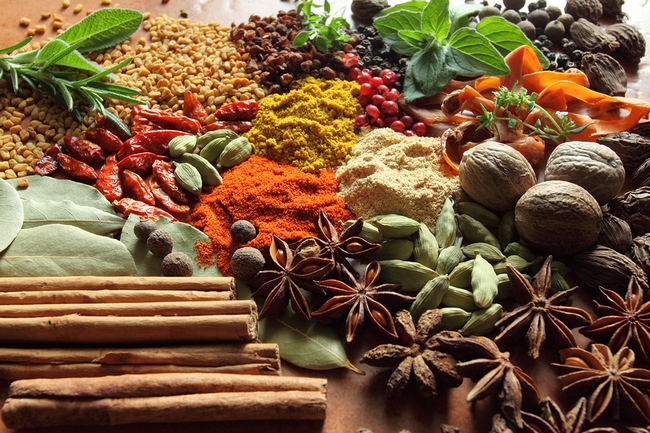- Make It Yourself Lavender Heart-Shaped Bath Bombs!
- 20 Things You Never Knew About “Down There”
- 12 Best Foods For Those Suffering From Arthritis Pain
- 12 Personal Hygiene Mistakes Almost Everyone Makes (Mom Never Told You About #4!)
- 15 Medicinal Plants And Herbs From The Cherokee People
- 12 Mind-Blowing Benefits Of Drinking Coconut Water During Pregnancy
- 12 Outstanding Winter Foods That Won’t Fatten You Up Like A Christmas Turkey
Top Tips and Herbs That Will Keep You Warm this Winter

Photo credit: bigstock
With another stretch of arctic weather about to descend, many people find it challenging to stay warm. Even shoveling snow or walking to work becomes bone chilling adventures. Chinese Herbal Medicine, however, tell us about herbs that will help to stoke the body’s internal fire, which can warm us from the inside out.
Many herbs can improve your circulation, making you feel warmer and drier, while filling your body with a powerhouse of antioxidants. Keep reading for the top herbs, and other tips, you can use to keep warm naturally during this cold winter months.
1. Ginger
Ginger is very warming and can be used in several ways. Fresh ginger is terrific for warming the body from cold weather, while calming the digestive system and improving immune function. Dried ginger is even more warming and is perfect for anyone suffering from a respiratory illness, long term digestive issues, or chronic diseases that tend to leave people feeling cold, especially in the winter. Find out real ginger ale recipe. No matter how you choose to consume it, ginger can be used to warm yourself up during those super cold, blistery days. You can have a hot cup of ginger tea or even a ginger bath to keep you warm all night without that electric blanket. To use ginger in your bath, boil about a half-gallon of water with eight ounces of ginger for about 20 minutes. Strain and pour this mixture into your bath.
2. Herbal Tea
For instant warming, not much beats sipping a steaming hot cup of tea. Herbs can nourish your body as well as warm you up quickly. Consider buying fresh herbs, rather than tea bags, and making your own warming herbal teas.
3. Grounding Roots
Chinese medicine also believes that by consuming grounding roots ( especially those that are grown locally) can help you acclimatize to the area you live in and not experience the cold so intensely. Grounding roots such as turnips, rutabagas, and onions are said to be helpful.
Continue to Page 2

Photo credit: bigstock
4. Cinnamon
Cinnamon can be used in two forms, the twig itself, which is used to warm energy channels and improve immune function. This is perfect for warming the extremities and treat joint pain that tends to become worse in cold weather.
The other form, cinnamon bark, is also very warming, especially right at our core. Cinnamon bark is terrific when it comes to warming the digestive system. If you tend to feel cold long after you have come into the house, or if you suffer from women’s health issues such as painful periods, this is the best form of cinnamon to use (read more about health benefits of cinnamon). Make your own tea, or sprinkle it liberally in your coffee, cereal, or baked goods.
5. Turmeric
Turmeric is the gently warming herb that not only treats the pain and swelling of inflammation, but is perfect for subtly increasing your core temperature.
6. Fennel Seeds
Fennel seed warms us up by focusing on the digestive tract. Fennel is often served after a meal in many countries, to improve digestion, and it does this by raising the body’s core temperature. If you tend to get gas, cramps, or bloating, try chewing on some fresh fennel.
7. Wear Bright Colors
Color therapy says that wearing bright, warm colors tricks your mind by seeing warm colors, such as red, orange, yellow, and copper, and believing that it is warm outside, or that you are somehow covered in warmth. Although there does not appear to be any scientific evidence to back this up, it certainly can’t hurt, and might help, at least as far as lifting your spirits on a dull, overcast, cold day.
Continue to Page 3

Photo credit: bigstock
8. Black Pepper
Be forewarned, black pepper is a very hot and spicy herb that should be used with caution and in moderation. However, for those who are super chilled, adding some black pepper to a meal or to some herbal tea will heat you up in a hurry! Find out how to use black pepper for the everyday common cold.
9. Coriander Seed
This is another gently warming herb that is good for anyone who is experiencing issues with their respiratory system or a weakness in their digestive system. Coriander works on the lungs and stomach, so it can prevent upper respiratory illnesses. If you feel a cough coming on after being out in the cold, try consuming some coriander seeds.
10. Horseradish
Related to the mustard family, not radishes, but this herb is more than just a tasty sandwich sauce. Horseradish is naturally antiseptic and has powerful decongestant properties, so if you have a stuffed up nose or head, try some horseradish to help clear your head and warm you up from the inside out.
Continue to Page 4

Photo credit: bigstock
Try this native South Indian tea formula for those cold winter days.
Warm You Up Tea
Ingredients:
- 3 Thumb sized pieces of fresh, organic ginger, peeled and sliced
- 4 Organic cinnamon sticks
- 1 Teaspoon organic ground turmeric
- ½ Cup of coriander seeds
- ½ Tablespoon molasses or real maple syrup
Boil about 2 cups of water, and then add everything except the molasses. Boil for 10 minutes, and then strain into a large mug. Add the molasses (or maple syrup) and stir well. Be sure to drink this as hot as possible, but don’t burn your tongue! You will feel this warmth for hours after you have finished drinking it.
































